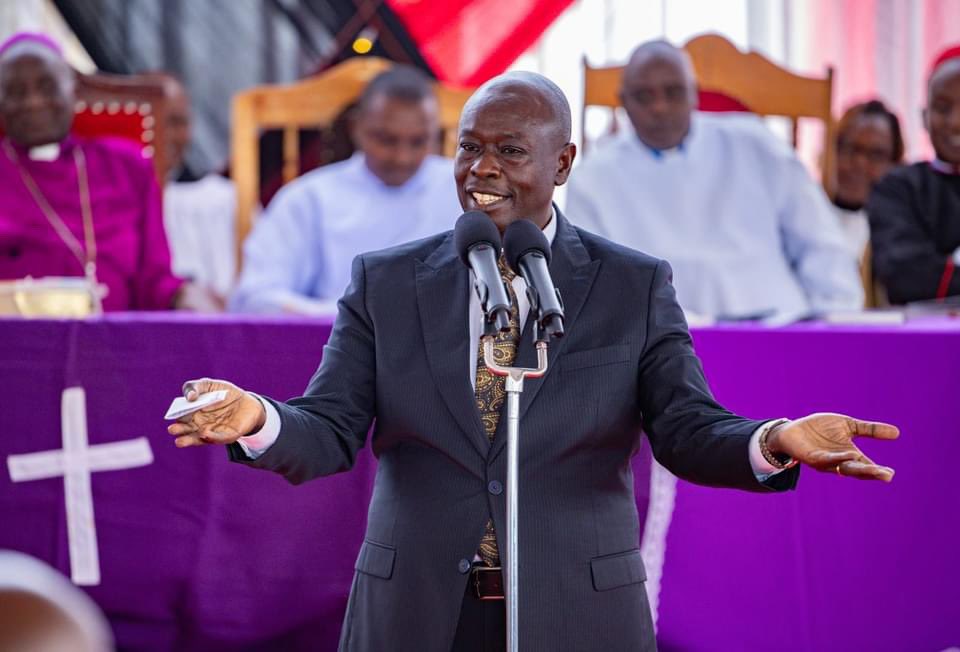BY REUBEN MUSONIK, POLITICAL EDITOR
Kenya’s political arena is currently marked by a growing divide between Deputy President Rigathi Gachagua and Kikuyu MP Kimani Ichung’wah, revealing deep tensions within President William Ruto’s government. Ichung’wah has publicly accused Gachagua of plotting to undermine the president by weakening his political grip on the strategically important Mt. Kenya region. This feud is not just a personal rivalry; it reflects broader concerns about leadership and succession within Kenya’s ruling party.
Ichung’wah, who is a staunch ally of President Ruto and the Majority Leader in Kenya’s National Assembly, has been vocal about Gachagua’s alleged moves to sabotage Ruto’s presidency. He accused the deputy president of positioning himself for a future presidential bid by subtly chipping away at Ruto’s support, particularly within Mt. Kenya—a region that played a key role in Ruto’s 2022 victory. The accusation sparked heated reactions, with some leaders siding with Ichung’wah, while others rushed to Gachagua’s defense.
At a fundraiser in Kikuyu Constituency, Ichung’wah suggested that Gachagua’s actions could be part of a larger plan to keep Ruto from securing a second term. He warned that any attempt to destabilize the ruling coalition would be met with strong political repercussions. The allegations ignited a political firestorm, with Ichung’wah’s comments echoing wider fears within the coalition of potential betrayal, a sentiment reminiscent of past political splits in Kenya’s volatile history.
Gachagua’s Defense
In response, Deputy President Gachagua has emphatically denied any disloyalty. While touring Nyeri and Kirinyaga counties, Gachagua reassured the public of his unwavering loyalty to both President Ruto and the people of Kenya. He emphasized that his actions have always been in line with the president’s directives, adding that he holds only two bosses: the president and the Kenyan electorate.
Gachagua’s supporters, including a number of MPs from Mt. Kenya, rallied to his side, defending his integrity and leadership. Notable defenders include Embakasi North MP James Gakuya and Embakasi Central MP Benjamin Gathiru, who suggested that forces within the government are conspiring to weaken Gachagua’s influence. Gakuya warned that any attempts to sideline Gachagua could backfire, potentially triggering political retaliation.
Tensions in Mt. Kenya
The growing tensions between Gachagua and Ichung’wah highlight a power struggle for control over Mt. Kenya, a region that is vital in determining national election outcomes due to its large voter base. Gachagua, who has positioned himself as the regional kingpin following his ascension to the deputy presidency, has been actively working to consolidate his power. He has made overtures to local leaders and businesses in an attempt to solidify his leadership of Mt. Kenya.
However, the split within Mt. Kenya’s political class suggests that Gachagua’s influence is not unchallenged. Meru MPs have publicly opposed Gachagua’s “one man, one vote, one shilling” campaign, further indicating that his support within the region is not monolithic. These internal divisions complicate Gachagua’s position, as he faces resistance from key local leaders who seem to be distancing themselves from his leadership approach.
The Broader Implications
The internal strife between Gachagua and Ichung’wah extends beyond regional politics. Analysts suggest that the public squabbling between the deputy president and other government officials threatens to derail the unity within the ruling coalition. While President Ruto has not directly addressed the issue, the fierce exchanges between Gachagua’s and Ichung’wah’s camps have led to speculation that the coalition may be headed towards a significant fracture. Observers fear that the internal bickering could distract from the government’s ability to deliver on key policy objectives, particularly as the country prepares for the 2027 general elections.
Aden Duale, a key political figure, has warned that the division could lead to broader instability within the country. He has compared the situation to the political upheavals seen in neighbouring countries, arguing that Kenya risks undermining its own progress if these conflicts continue unchecked. Additionally, the ongoing internal battles within the ruling coalition could weaken Ruto’s political agenda, particularly his efforts to maintain a unified front in the face of external opposition.
Conclusion
The political tensions between Gachagua and Ichung’wah underscore the fragility of alliances within Kenya’s ruling coalition. As accusations of betrayal and counter-accusations of political overreach dominate public discourse, it is clear that Kenya’s leadership faces significant challenges in maintaining cohesion. Gachagua’s efforts to consolidate his influence in Mt. Kenya have been met with staunch opposition, not just from within his party but from local leaders who feel alienated by his approach. This power struggle is a reminder of the delicate balance of power in Kenyan politics, where ethnic and regional dynamics play a critical role in shaping national leadership.
As the 2027 elections approach, the fallout from this political rivalry could have profound implications for both the ruling coalition and Kenya’s broader political landscape.
